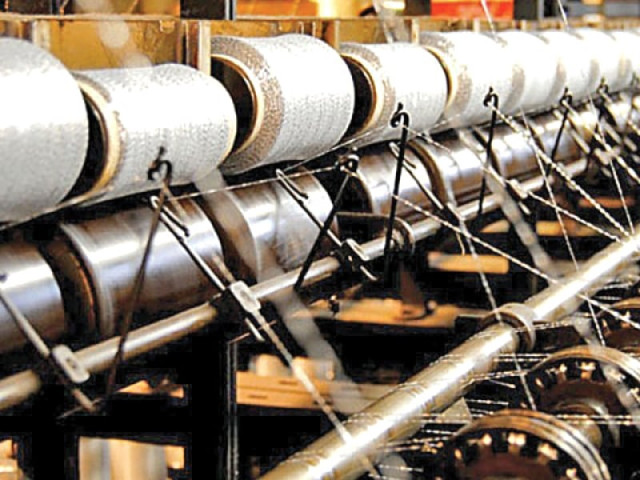Textile industry makes impassioned plea for bailout
Seeks concessions and incentives from govt to stay afloat.

Representatives of the textile sector urged the government to urgently address the issues faced by them. PHOTO: FILE
At a joint press conference attended by major textile associations of the country on Wednesday, a collective plea was made to the government to bail the industry out its current state of turmoil.
Industry representatives asked the government to allow a 10% compensation rebate on exports from March to September, exempt export purchases from sales tax, reduce cost of business, inject liquefied natural gas (LNG) into the system and link markup with the London Inter-bank Offered Rate (Libor).
Pakistan Textile Exporters Association (PTEA) Chairman Sheikh Ilyas Mahmood warned that the textile industry in Punjab had been on the verge of disaster. “A sudden surge of around 12-15% in the rupee’s value against the dollar has disturbed business cycle, causing a direct inventory loss of Rs78 billion,” he said.
Mahmood said 30-40% working capital of textile exporters was stuck in sales tax and customs duty rebate, creating a severe liquidity crunch.
He termed high interest rates a hurdle in the way of investment as bank markup in Pakistan was higher than regional competitors, hindering export growth.
Naveed Gulzar, who represented the All Pakistan Textile Mills Association (Aptma), said around 80% of textile units were in Punjab, which employed 15 million people.
“By ignoring Punjab’s industries, the government is neglecting a major part of the country’s industry,” he remarked.
Representatives of the textile sector urged the government to urgently address the issues faced by them. They believe that challenges such as energy crisis, high interest rates, liquidity crunch and financial stress were keeping the industry from performing to its full potential
Power shortages
Separately at a press conference in Karachi, Aptma pushed the government to immediately release sales tax refunds and enhance power supply to the textile industry, especially in Punjab.
Association Chairman Yasin Siddik pointed out that delay in release of refunds, electricity and gas load-shedding and a sharp appreciation of the rupee had all contributed to the woes of the export industry.
According to him, over 972,000 spindles have been closed down in the last few weeks because of outages and other such problems. The northern region of the country has been mainly affected as about 70% of spindles have been shut down in Faisalabad and Multan regions alone.
“If the government does not take immediate steps, more textile units will be closed down in the next few months and this may create serious problems of unemployment and security,” he said.
About delay in clearance of refund claims, Siddik said around Rs30 billion was stuck with the government, which was causing acute shortage of running finance for the industry.
Aptma has been consistently requesting the government to give some rebate to the textile exporters to help them recover 6-9% of the loss caused by the appreciation of the rupee since January. So far, the government has been reluctant to commit anything. When Commerce Minister Khurram Dastgir visited Aptma House last week, he only assured the industry that the ministry was trying to release all refunds.
Published in The Express Tribune, May 8th, 2014.
Like Business on Facebook, follow @TribuneBiz on Twitter to stay informed and join in the conversation.



















COMMENTS
Comments are moderated and generally will be posted if they are on-topic and not abusive.
For more information, please see our Comments FAQ